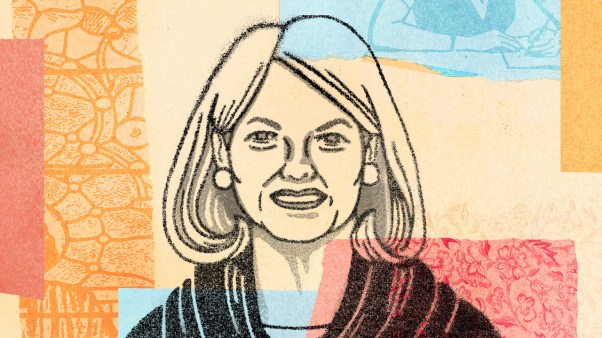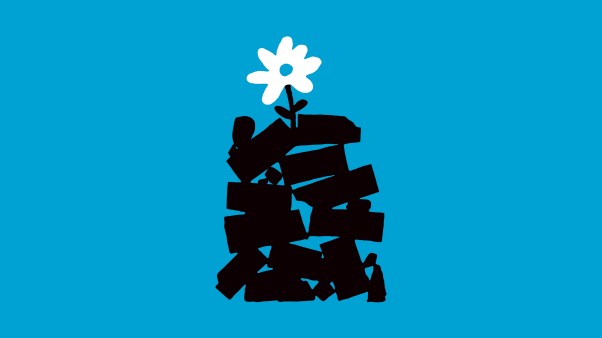I’m afraid these men would only slow me down,” says a cocksure Benedict Cumberbatch in the role of the godfather of computer science, Alan Turing. A 2014 biopic, The Imitation Game, portrays Turing as a lonely, world-changing genius who reluctantly takes on help from less intelligent colleagues who’d only threaten his efficiency and from whom he has to hide secrets that threaten his clearance, career, and life. As it turns out, he will need his friends’ help to keep his job, and together, they crack the Nazis’ Enigma code and create the prototypical model for a computer, the Turing machine (this is history, not a spoiler!).
One of Turing’s many contributions to the development of computing intelligence was the Turing test—a method designed to probe a machine’s ability to display intelligent behavior a human observer might confuse for human behavior. Needless to say, we’ve come a long way in that department. In (successfully) designing computers to match and exceed many aspects of our own cognitive faculties, we find ourselves in a chaotic battlefield where grim doomsday jeremiads about AI and utopian techno-optimist manifestos vie for the soul of humankind.
Guiding these rapid-fire developments is a powerful metaphor: the human mind as computer. And the more we use this metaphor, the more readily we come to believe it. And yet, as this mindset has infused itself into our collective unconscious, it’s been met with more and more resistance.
Consider philosopher and cognitive scientist Tim van Gelder, author of the 1995 essay “What Might Cognition Be, If Not Computation?” In it, he suggests that the Turing machine (a computational model) is less helpful for modeling human cognition than what he calls a “dynamical system.” Such a system is constantly adapting to an always changing environment, responding and adjusting in an automatic give-and-take relationship, whereas a Turing machine is geared only at solving a specific equation.
In other words, our brains are always growing and adapting to our world; they’re not machines programmed with a set algorithm for a specific outcome.
Giving shape to the intangible
In her newest book, You Are a Tree: And Other Metaphors to Nourish Life, Thought, and Prayer, writer Joy Marie Clarkson explores the metaphors we inhabit in our everyday lives. In our rush to adopt and live into powerful metaphors, we can easily forget that metaphors are, by definition, incomplete approximations. As Clarkson explains in her introduction, “This is why French philosopher Paul Ricoeur proposes what might be described as a tension theory of metaphor … between a literal and metaphorical interpretation. In noticing where the metaphor stops, we are forced to pay closer attention to why the thing isn’t actually what we describe it to be.”
Clarkson exemplifies a new generation of Substack writers and thinkers who’ve gained an audience by sharing thoughts as they go, blending diary-esque observations with erudite notes related to research and writing projects. Reading her book feels more like catching up with an old friend over coffee than sitting at the feet of a remote, inaccessible sage.
While van Gelder and Clarkson find common ground in their resistance to the “human as computer” metaphor, the similarities stop there. Van Gelder writes in a dense, mathematical style (more power to you if that’s your thing), and still employs a machine-based metaphor to describe human thought. Clarkson, on the other hand, is a theology and literature scholar at King’s College London, and her words flow from a passion for poetry, literature, story, and the Bible, revealing a whimsically fun wit and an openness to everyday wonder. She sticks to more agricultural and naturalistic metaphors, arguing that computers, “as a systematic metaphor for human flourishing,” are “incomplete and unforgiving.”
As her book title suggests, Clarkson believes you are less like a computer (designed to work with perfect efficiency) and more like a tree in a forest. Trees, not unlike Turing with his peers, need the sustaining roots of surrounding trees to help them flourish amid seasons of poverty and plenty alike.
You Are a Tree begins with a compelling reintroduction to the concept of metaphors, unpacking just how subtly they can shape us. Metaphors are more than just another poetic tool in one’s flowery-language kit—they can generate cathartic aha moments of self-understanding by giving tangible form to intangible, inexpressible feelings or ideas.
Clarkson shares how, for most of her life, she has been compelled to move from place to place, leaving her to feel like a potted plant whose roots can only go so deep. As she recalls, landing on that potted-plant metaphor “pained but also satisfied me.” A good metaphor is freeing, because it allows us “to speak about our experiences” and to “give these things shape so that we can look at them, talk about them, show them to other people so they can be witnessed, maybe even understood.” Through metaphors, we can know and be known.
Poor metaphors, however, can be dangerous. Unhelpful comparisons are more than just conceptually unclear—they can tempt us into ascribing misleading and even dehumanizing traits to ourselves and others. Clarkson points out how the humans-as-computers metaphor places the highest value on productivity, which can imply that less productive people are broken or expired, and therefore more disposable. This metaphor says, If you can’t function as well, you are less valuable.
Metaphors are not neutral, then. Whether we choose them consciously or absorb them unconsciously, they have a subtle but powerful influence on our lives, and wrestling with them can play a vital role in our individual journeys of spiritual formation.
After establishing the flawed nature of mechanistic metaphors for humanity, Clarkson reserves most of her chapters for unpacking a set of better, richer metaphors (not to mention metaphors within metaphors). In a patient and pleasantly meandering fashion, she traces their appearances in Scripture, literature, and everyday life. Clarkson further equips readers for reflection with examples and recommendations drawn from poems, paintings, films, songs, and even architecture.
The wisdom of clichés
You Are a Tree is an illuminating guide to the metaphors we use for God and our own lives, and it will show you how to meditate on a metaphor and let its deeper meanings speak. One testament to Clarkson’s depth and insight comes from the fact that many metaphors she covers—“wisdom is light,” for instance, or “life is a journey”—explore phrases you’ve probably heard countless times before, to the point of sounding clichéd. What more could one add? Yet Clarkson consistently breathes new life into language that can seem trite at first glance.
Because of the book’s meditative approach and sometimes winding path, some parts will likely prove more interesting than others, depending on how resonant particular metaphors are to particular readers. When specific sections aren’t resonating, the metaphors may start to feel a bit monotonous, and the chapters’ flowing structure might begin to feel unfocused. This is one reason I’d recommend reading the book in shorter increments (one to two sittings per chapter) rather than churning right through. For a relatively short book, You Are a Tree covers a lot of ground, almost like a survey course for college undergraduates. It is packed with insight, though, and if you pay attention (as she reminds us often), you should come away with a wealth of profound and potentially paradigm-shifting insight.
In the final chapter, Clarkson expounds on the “life is a journey” metaphor, admitting to the tricky balancing act she faces in even writing about such commonplace phrases. As she puts it, “I realize I am dangerously close to becoming a ridiculous inspirational plaque in a home-and-garden shop. Life is not about the destination, but the journey,” after which she half-jokingly philosophizes, “But what is life and what is a journey?” In actually diving into these questions, Clarkson tears back the overfamiliarity veil that so often cloaks the simplest but deepest truths.
In reflecting on why life really is a journey, Clarkson brings up Augustine’s sense of restless longing, or, in her words, “what the German existentialists might call Unheimlichkeit, a radical homelessness,” an idea she expands on with references to Camus, Heidegger, James K. A. Smith, and The Lord of the Rings , among others. As a third-culture kid myself—someone with a complicated relationship to the concepts of home and belonging—this resonated immensely. It’s something I will explore a lot more in my own writing. And I’m confident there’ll be at least one image or idea, and likely many more, that will similarly resonate with you.
Raed Gilliam is a writer and filmmaker, and an associate producer for CT Media.










